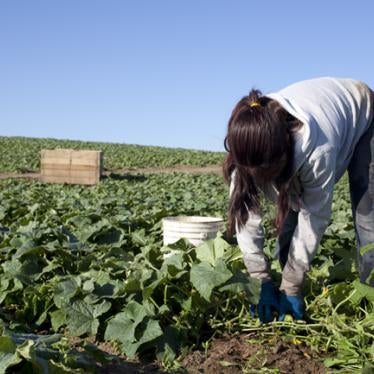In every state, children can be tried as adults. Child marriage is still happening in many states, and so is corporal punishment and child labor.
The US is the only UN member country that has not ratified the international treaty on children’s rights. Most people might think this isn’t such a big deal because the US is good to children. But it turns out we aren’t and our state laws don’t help.
A new Human Rights Watch scorecard grades all 50 states on their laws related to child marriage, child labor, juvenile justice and corporal punishment. We gave 20 states a failing “F” grade, and 26 a “D,” including Florida. Not a single state received a “B” or an “A.” New Jersey, Ohio, Iowa and Minnesota were the only states to receive a “C” grade. (Florida came in ninth.) By contrast, states at the bottom of our ranking include Mississippi, Wyoming, Oklahoma, Georgia and Washington.
Forty-three states still allow child marriage, with over a quarter million children, some as young as 10, married in the US between 2018 and 2020. No US state prohibits violence to discipline children. Approximately 160,000 children are subjected to corporal punishment in schools each year, despite extensive research finding that paddling children is ineffective in correcting their behavior and increases child aggression.
Weak child labor laws allow children as young as 12 to work 50 or 60 hours a week in agriculture, the most dangerous industry for US child workers. The minimum age in Florida is 14. Half of US states, including Florida, allow children under 18 to be sentenced to life in prison without the possibility of parole, and more than 50,000 children are tried in adult courts every year, often resulting in extreme and punitive prison sentences and higher recidivism rates.
All of these practices violate international standards, and several disproportionately affect children of color and children with disabilities. For example, 62% of those serving sentences of life without parole for offenses committed as children are Black, even though they make up only 14% of the total youth population in the US. In some US school districts, children with disabilities are over five times more likely to experience violent punishment than other children.
The Convention on the Rights of the Child, the primary international treaty on the rights of children, was adopted by the United Nations in 1989. It addresses children’s rights to education, to health, to an adequate standard of living, to freedom of expression, protection from violence and exploitation, and a broad array of other rights. The US failure to ratify the Convention and live up to its principles not only harms US children, but also undermines US influence globally as a leader on human rights.
Some states have taken recent action to improve their protection of children. Massachusetts banned child marriage this year, and Colorado and Maryland improved their juvenile justice laws, raising their rankings on our scorecard.
To do right by its children, the US should ratify the Convention on the Rights of the Child. At the state level, policymakers should take a hard look at the report card for their state and take action to improve their legal protections for children. Neither state nor federal policymakers should tolerate laws that put children at risk.
Jo Becker is the children’s rights advocacy director for Human Rights Watch. Callie King-Guffey, a 2022 graduate from the Harvard Kennedy School, assessed state laws for Human Rights Watch’s new US child rights scorecard. Follow them on Twitter at @jobeckerhrw and @calliekingguffey.










